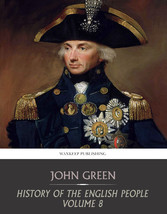
History of the English People Volume 8

von: John Green
Charles River Editors, 2018
ISBN: 9781508016458
Sprache: Englisch
205 Seiten, Download: 2603 KB
Format: EPUB
CHAPTER III
INDUSTRIAL ENGLAND.1782-1792
THAT IN THE CREATION OF the United States the world had reached one of the turning-points in its history seems at the time to have entered into the thought of not a single European statesman. What startled men most at the moment was the discovery that England herself was far from being ruined by the greatness of her defeat. She rose from it indeed stronger and more vigorous than ever. Never had she shown a mightier energy than in the struggle against France which followed only ten years after her loss of America, nor did she ever stand higher among the nations than on the day of Waterloo. Her internal developement was as imposing as her outer grandeur. Weary and disgraceful indeed as was the strife with the Colonies, the years of its progress were years of as mighty a revolution for the mother country as for its child. The England that is about us dates from the American War. It was then that the moral, the philanthropic, the religious ideas which have moulded English society into its present shape first broke the spiritual torpor of the eighteenth century. It was then that with the wider diffusion of intelligence our literature woke to a nobler and larger life which fitted it to become the mouthpiece of every national emotion. It was then that by a change unparalleled in history the country laid aside her older agricultural character to develope industrial forces which made her at a single bound the workshop of the world. Amidst the turmoil of the early years of George the Third Brindley was silently covering England with canals, and Watt as silently perfecting his invention of the steam-engine. It was amidst the strife with America that Adam Smith regenerated our economical, Gibbon our historical, and Burke our political literature; and peace was hardly declared when the appearance of Crabbe, Cowper, and Burns heralded a new birth of our poetry.
No names so illustrious as these marked the more silent but even deeper change in the religious temper of the country. It dates, as we have seen, from the work of the Wesleys, but the Methodists themselves were the least result of the Methodist revival. Its action upon the Church broke the lethargy of the clergy; and the “Evangelical” movement, which found representatives like Newton and Cecil within the pale of the Establishment, made the fox-hunting parson and the absentee rector at last impossible. In Walpole’s day the English clergy were the idlest and the most lifeless in the world. In our own time no body of religious ministers surpasses them in piety, in philanthropic energy, or in popular regard. But the movement was far from being limited to the Methodists or the clergy. In the nation at large appeared a new moral enthusiasm which, rigid and pedantic as it often seemed, was still healthy in its social tone, and whose power showed itself in a gradual disappearance of the profligacy which had disgraced the upper classes, and the foulness which had infested literature ever since the Restoration. A yet nobler result of the religious revival was the steady attempt, which has never ceased from that day to this, to remedy the guilt, the ignorance, the physical suffering, the social degradation of the profligate and the poor. It was not till the Wesleyan impulse had done its work that this philanthropic impulse began. The Sunday Schools established by Mr. Raikes of Gloucester at the close of the century were the beginnings of popular education. By writings and by her own personal example Hannah More drew the sympathy of England to the poverty and crime of the agricultural labourer. A passionate impulse of human sympathy with the wronged and afflicted raised hospitals, endowed charities, built churches, sent missionaries to the heathen, supported Burke in his plea for the Hindoo, and Clarkson and Wilberforce in their crusade against the iniquity of the slave trade.
It is only the moral chivalry of his labours that amongst a crowd of philanthropists draws us most to the work and character of John Howard. The sympathy which all were feeling for the sufferings of mankind Howard felt for the sufferings of the worst and most hapless of men. With wonderful ardour and perseverance he devoted himself to the cause of the debtor, the felon, and the murderer. An appointment to the office of High Sheriff of Bedfordshire in 1774 drew his attention to the state of the prisons which were placed under his care; and from that time the quiet country gentleman, whose only occupation had been reading his Bible and studying his thermometer, became the most energetic and zealous of reformers. Before a year was over he had personally visited almost every English gaol, and in nearly all of them he found frightful abuses which had been noticed half-a-century before, but which had been left unredressed by Parliament. Gaolers who bought their places were paid by fees, and suffered to extort what they could. Even when acquitted, men were dragged back to their cells for want of funds to discharge the sums they owed to their keepers. Debtors and felons were huddled together in the prisons which Howard found crowded by the legislation of the day. No separation was preserved between different sexes, no criminal discipline was enforced. Every gaol was a chaos of cruelty and the foulest immorality, from which the prisoner could only escape by sheer starvation or through the gaol-fever that festered without ceasing in these haunts of misery. Howard saw everything with his own eyes, he tested every suffering by his own experience. In one prison he found a cell so narrow and noisome that the poor wretch who inhabited it begged as a mercy for hanging. Howard shut himself up in the cell and bore its darkness and foulness till nature could bear no more. It was by work of this sort and by the faithful pictures of such scenes which it enabled him to give that he brought about their reform. The book in which he recorded his terrible experience and the plans which he submitted for the reformation of criminals made him the father, so far as England is concerned, of prison discipline. But his labours were far from being confined to England. In journey after journey he visited the gaols of Holland and Germany, till his longing to discover some means of checking the fatal progress of the Plague led him to examine the lazarettos of Europe and the East. He was still engaged in this work of charity when he was seized by a malignant fever at Cherson in Southern Russia, and “laid quietly in the earth,” as he desired.
In Howard’s later labours the new sentiment of humanity had carried him far beyond the bounds of national sympathy; and forces at once of pity and religion told more and more in begetting a consciousness of the common brotherhood of man. Even at the close of the American war this feeling had become strong enough to colour our political life. It told on the attitude of England towards its great dependency of India. Discussions over rival plans of Indian administration diffused a sense of national responsibility for its good government, and there was a general resolve that the security against injustice and misrule which was enjoyed by the poorest Englishman should be enjoyed by the poorest Hindoo. It was this resolve which expressed itself in 1786 in the trial of Warren Hastings. Hastings returned from India at the close of the war with the hope of rewards as great as those of Clive. He had saved all that Clive had won. He had laid the foundation of a vast empire in the East. He had shown rare powers of administration, and the foresight, courage, and temperance which mark the born ruler of men. But with him came rumours of tyranny and wrong. Even those who admitted the wisdom and glory of his rule shrank from its terrible ruthlessness. He was charged with having sold for a vast sum the services of British troops to crush the free tribes of the Rohillas, with having wrung half-a-million by extortion from the Rajah of Benares, with having extorted by torture and starvation more than a million from the Princesses of Oudh. He was accused of having kept his hold upon power by measures as unscrupulous, and with having murdered a native who opposed him by an abuse of the forms of English law. On almost all these charges the cooler judgement of later inquirers has acquitted Warren Hastings of guilt. Personally there can be little doubt that he had done much to secure to the new subjects of Britain a just and peaceable government. What was hardest and most pitiless in his rule had been simply a carrying out of the system of administration which was native to India and which he found existing there. But such a system was alien from the new humanity of Englishmen; and few dared to vindicate Hastings when Burke in words of passionate earnestness moved for his impeachment.
The great trial lingered on for years; and in the long run Hastings secured an acquittal. But the end at which the impeachment aimed had really been won. The attention, the sympathy of Englishmen had been drawn across distant seas to a race utterly strange to them; and the peasant of Cornwall or Cumberland had learned how to thrill at the suffering of a peasant of Bengal. And even while the trial was going on a yet wider extension of English sympathy made itself felt. The hero-seamen of Elizabeth had not blushed to make gain out of kidnapping negroes and selling them into slavery. One of the profits which England bought by the triumphs of Marlborough was a right to a monopoly of the slave-trade between Africa and the Spanish dominions; and it was England that had planted slavery in her American colonies and her West Indian islands. Half the wealth of Liverpool, in fact, was drawn from the traffic of its merchants in human flesh. The...








